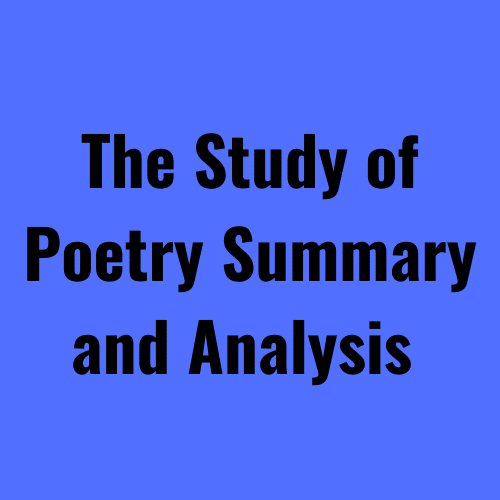The Study of Poetry Summary and Analysis
By Matthew Arnold (1822-1888)
Key information
Published date: The essay was first published in 1880 as the general introduction to the anthology “The English Poets” edited by T. H. Ward. In 1888, the essay was published in the second series of essays “Essays on Criticism”.
Division of the essay: The essay is divided into two parts:
i. The nature and function of poetry
ii. Evaluation of English poets from Chaucer onwards
The Study of Poetry Summary and Analysis
Arnold has started his essay with a declaration that the future of poetry is immense অপরিসীম since religion has been materialistic. With the passage of time, people will realize that poetry will satisfy them and give shelter in times of crisis. Besides poetry interprets ব্যাখ্যা life properly. Science will be incomplete without poetry because poetry is the soul of all branches of knowledge. Arnold shows logic referring to William Wordsworth that basically poetry is the spirit of all branches of knowledge.
Arnold relates that all branches of knowledge have been charlatans. Theology is charlatan because people feel doubt as to the doctrine of theology that is why there is a conflict between religion and science. Philosophy is also a charlatan because philosophy is unable to answer all the questions. Arnold does not declare directly that politics is charlatan but he does give a designation to politics as the art of governing mankind, not the best art of governing mankind.
Then Arnold asserts that the high position of poetry cannot be preserved without maintaining three basic rules.
i. There must have been criticism of life in poetry
ii. To write poetry, a poet must follow the rule of poetic truth and beauty
iii. And maintenance of grand style
Here in this essay, Arnold means to say that by reading poetry the audience can identify their faults and mistakes for the purpose of rectification and they must apply the powerful ideas picked up through reading poetry. By the term poetic truth, Arnold is similar to Aristotle who defines poetic truth as “Poetic truth how something should happen or will happen”. This definition of poetic truth asserts that poets never tell lies; that means there is no place for charlatanism in poetry and the message of poetry will last for generation after generation.
By grand style, Arnold gives a guideline that for composing poetry a poet has to adhere to মেনে চলা meter and figurative language which provide delight to the readers while reading poetry. (The Study of Poetry Summary and Analysis )
Now Arnold talks about the judgment of poetry for the purpose of fixing classic and non-classic poets through his inventive and scientific touchstone method. For the proper judgment of poet Arnold provides directions based on three estimates অনুমান.
i. Real estimate
ii. Personal estimate and
iii. Historical estimate
Arnold believes in real estimates for the judgment of poetry properly and completely because real estimates of poetic evaluation focus on the criticism of life and the high seriousness of poetry. Personal and historical estimates without the presence of real estimate create overrate and exaggeration অতিরিক্ত এবং অতিরঁজন.
Then Arnold evaluates all the poets of English literature from Chaucer onwards whether they are classic or not. He emphasizes that a single line of poets can make them classic if there is criticism of life and high seriousness that means grand style.
Homer, Dante, Shakespeare, and Milton have been given the prestige of classical poets because their poetry deserves the universal criticism of life and high seriousness. But the matter of sorrow is that Chaucer has been called a non-classic poet though Arnold has provided a long and praiseworthy evaluation of Chaucer as the father of English poetry and having liquid diction like Milton, Keats, Wordsworth, and Byron Chaucer’s poetry does not possess high seriousness, grand style.
John Dryden and Alexander Pope are also not classic poets. Dryden has been considered to be the puissant গৌরবময় and glorious founder of prose writing and Pope is the priest of prose composition. Overall, they are the classics of prose, not poetry.
Arnold discovers in his essay that the complete modernism of English literature started in the Romantic period of English literature. Therefore, the romantics are the first modern poets. All the romantics except Shelley are considered to be classic poets because of Arnold’s less possession of lyricism.
Real Burns who is an influential Scottish poet has been evaluated like Chaucer. Finally, Arnold asserts that the readers who can apply the touchstone method properly can read classical poems. (The Study of Poetry Summary and Analysis )
